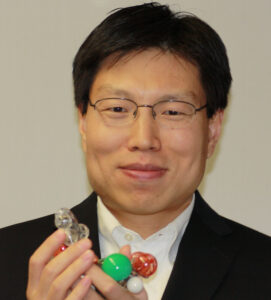 http://s.uconn.edu/meseminar3/11/22
http://s.uconn.edu/meseminar3/11/22
Abstract: The extracellular matrix (ECM) guides cells through mechanical and soluble signals among others. We guide cell behaviors using these two aspects of ECM. Even the bone ECM is soft after de-mineralization. Thus, we are interested in soft polymeric materials. Many tissues in our body are elastic including blood vessels, our target tissue. We design elastomers for vascular grafts. The hosts transform the degradable grafts into autologous vascular conduits within a few months, performing the duties of a native artery. On soluble factors, we mimic the anchorage of cytokines in the ECM with heparin-based coacervate. The coacervate extends the bioactivity of many cytokines and growth factors. This controlled release platform shows promise in promoting angiogenesis and controlling immune activities. We are currently exploring how these materials perform in preclinical models, with robust rodent data and early large animal data.
Biographical Sketch: Yadong Wang is the McAdam Family Foundation Professor of Heart Assist Technology at Cornell University. He obtained his Ph.D. degree at Stanford University in 1999, performed his postdoctoral studies at MIT, and joined the Georgia Institute of Technology in 2003 as an assistant professor. He was recruited to University of Pittsburgh in 2008 and subsequently to Cornell in 2017. He has published on topics ranging from Chemistry, Materials Science to Biomedical Engineering in journals including Science, Nature Biotechnology, Nature Medicine, and PNAS. Several of his inventions are licensed, one polymer he invented is now commercially available and approved for clinical use. He co-founded three companies to translate the technologies developed in his laboratory. His research focuses on creating biomaterials for unmet clinical needs in soft tissues. His team enjoys collaboration with others who share the same passion for translational research.